A Critical Review of Lobbying's Impact on Accounting Standard Setting
VerifiedAdded on 2020/10/05
|11
|3635
|120
Report
AI Summary
This report provides a critical review of lobbying in the accounting standard-setting process, focusing on the influence of various parties on the development and implementation of accounting standards. It examines the application of agency and stakeholder theories to understand lobbying activities, and how they impact regulatory outcomes. The report analyzes the roles of IASB and IFRS, and the challenges related to fair value measurements and financial instrument accounting. It also explores the impact of lobbying on countries with large capital markets and the importance of participation from various regions, like Africa and South America. The analysis highlights the potential biases of private bodies and the need for proper disclosures and theoretical frameworks. This report is designed to help students understand the complex dynamics of lobbying in accounting standards, its impact on financial reporting, and the global implications.
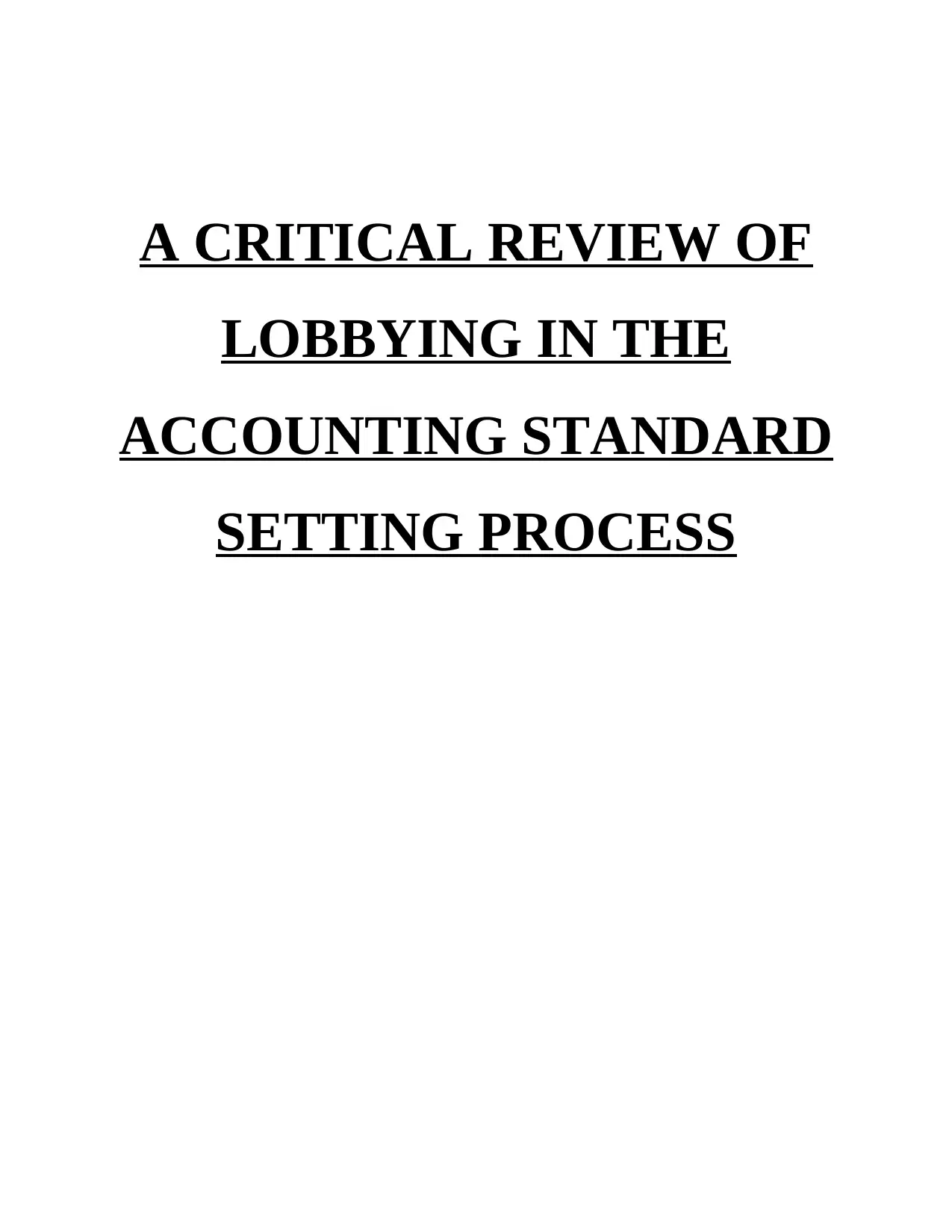
A CRITICAL REVIEW OF
LOBBYING IN THE
ACCOUNTING STANDARD
SETTING PROCESS
LOBBYING IN THE
ACCOUNTING STANDARD
SETTING PROCESS
Paraphrase This Document
Need a fresh take? Get an instant paraphrase of this document with our AI Paraphraser
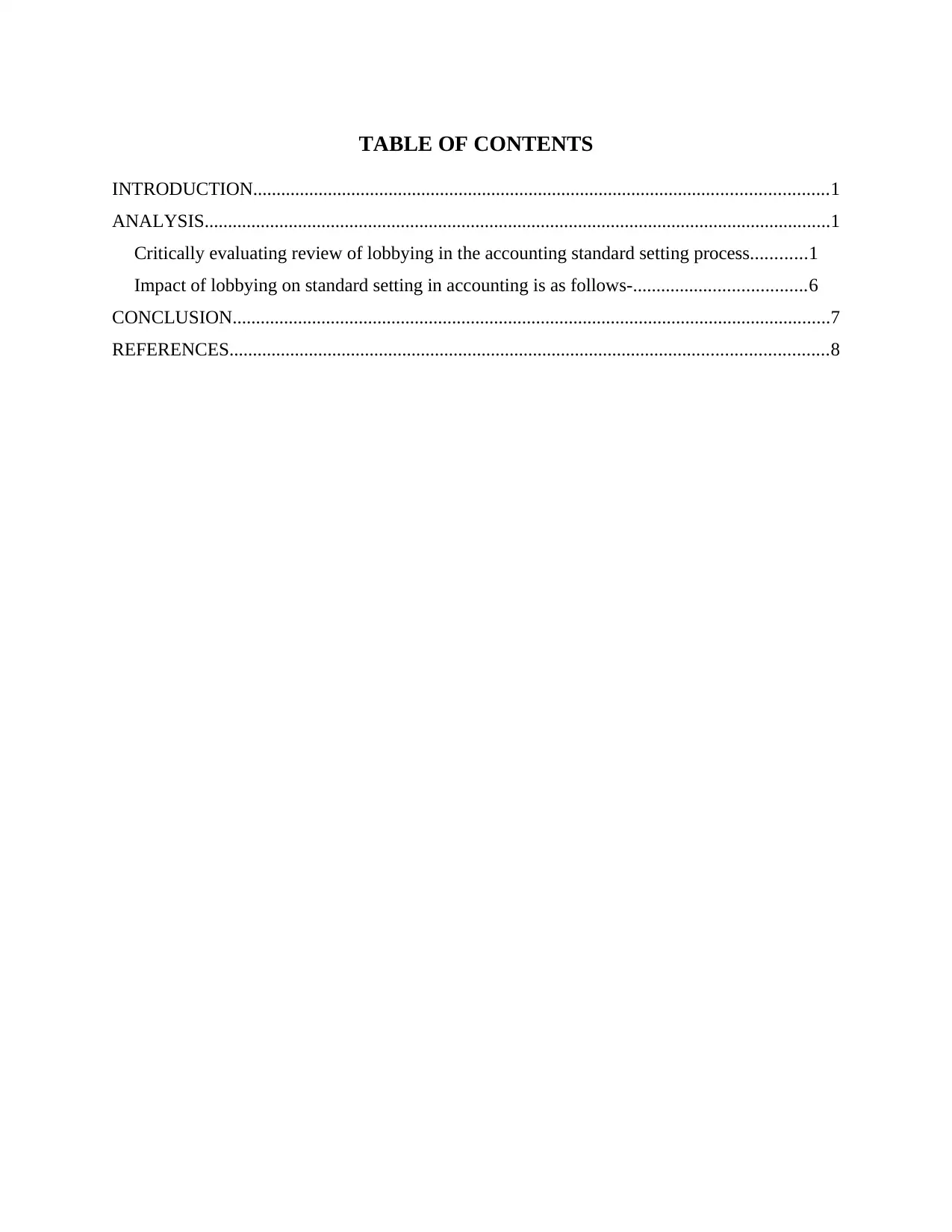
TABLE OF CONTENTS
INTRODUCTION...........................................................................................................................1
ANALYSIS......................................................................................................................................1
Critically evaluating review of lobbying in the accounting standard setting process............1
Impact of lobbying on standard setting in accounting is as follows-.....................................6
CONCLUSION................................................................................................................................7
REFERENCES................................................................................................................................8
INTRODUCTION...........................................................................................................................1
ANALYSIS......................................................................................................................................1
Critically evaluating review of lobbying in the accounting standard setting process............1
Impact of lobbying on standard setting in accounting is as follows-.....................................6
CONCLUSION................................................................................................................................7
REFERENCES................................................................................................................................8
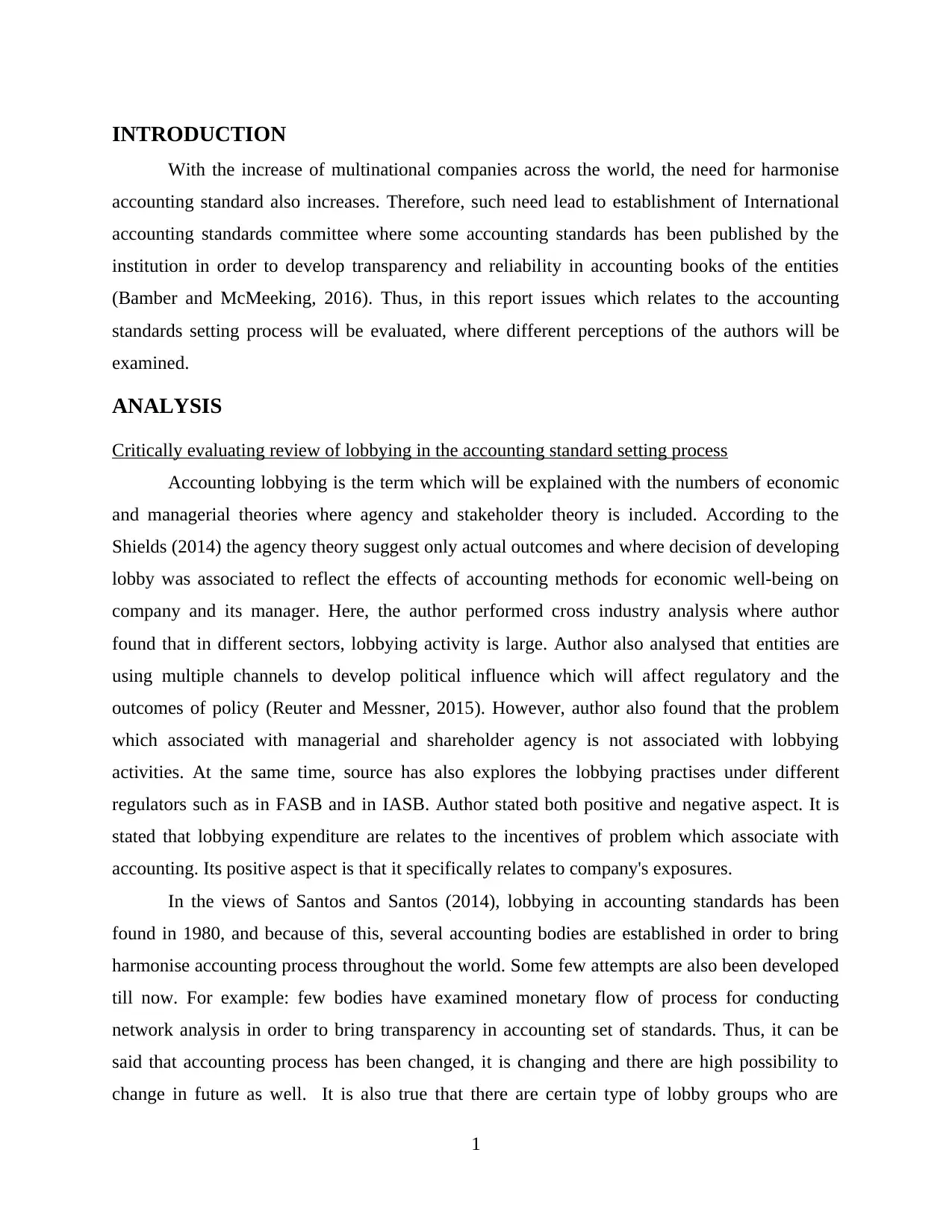
INTRODUCTION
With the increase of multinational companies across the world, the need for harmonise
accounting standard also increases. Therefore, such need lead to establishment of International
accounting standards committee where some accounting standards has been published by the
institution in order to develop transparency and reliability in accounting books of the entities
(Bamber and McMeeking, 2016). Thus, in this report issues which relates to the accounting
standards setting process will be evaluated, where different perceptions of the authors will be
examined.
ANALYSIS
Critically evaluating review of lobbying in the accounting standard setting process
Accounting lobbying is the term which will be explained with the numbers of economic
and managerial theories where agency and stakeholder theory is included. According to the
Shields (2014) the agency theory suggest only actual outcomes and where decision of developing
lobby was associated to reflect the effects of accounting methods for economic well-being on
company and its manager. Here, the author performed cross industry analysis where author
found that in different sectors, lobbying activity is large. Author also analysed that entities are
using multiple channels to develop political influence which will affect regulatory and the
outcomes of policy (Reuter and Messner, 2015). However, author also found that the problem
which associated with managerial and shareholder agency is not associated with lobbying
activities. At the same time, source has also explores the lobbying practises under different
regulators such as in FASB and in IASB. Author stated both positive and negative aspect. It is
stated that lobbying expenditure are relates to the incentives of problem which associate with
accounting. Its positive aspect is that it specifically relates to company's exposures.
In the views of Santos and Santos (2014), lobbying in accounting standards has been
found in 1980, and because of this, several accounting bodies are established in order to bring
harmonise accounting process throughout the world. Some few attempts are also been developed
till now. For example: few bodies have examined monetary flow of process for conducting
network analysis in order to bring transparency in accounting set of standards. Thus, it can be
said that accounting process has been changed, it is changing and there are high possibility to
change in future as well. It is also true that there are certain type of lobby groups who are
1
With the increase of multinational companies across the world, the need for harmonise
accounting standard also increases. Therefore, such need lead to establishment of International
accounting standards committee where some accounting standards has been published by the
institution in order to develop transparency and reliability in accounting books of the entities
(Bamber and McMeeking, 2016). Thus, in this report issues which relates to the accounting
standards setting process will be evaluated, where different perceptions of the authors will be
examined.
ANALYSIS
Critically evaluating review of lobbying in the accounting standard setting process
Accounting lobbying is the term which will be explained with the numbers of economic
and managerial theories where agency and stakeholder theory is included. According to the
Shields (2014) the agency theory suggest only actual outcomes and where decision of developing
lobby was associated to reflect the effects of accounting methods for economic well-being on
company and its manager. Here, the author performed cross industry analysis where author
found that in different sectors, lobbying activity is large. Author also analysed that entities are
using multiple channels to develop political influence which will affect regulatory and the
outcomes of policy (Reuter and Messner, 2015). However, author also found that the problem
which associated with managerial and shareholder agency is not associated with lobbying
activities. At the same time, source has also explores the lobbying practises under different
regulators such as in FASB and in IASB. Author stated both positive and negative aspect. It is
stated that lobbying expenditure are relates to the incentives of problem which associate with
accounting. Its positive aspect is that it specifically relates to company's exposures.
In the views of Santos and Santos (2014), lobbying in accounting standards has been
found in 1980, and because of this, several accounting bodies are established in order to bring
harmonise accounting process throughout the world. Some few attempts are also been developed
till now. For example: few bodies have examined monetary flow of process for conducting
network analysis in order to bring transparency in accounting set of standards. Thus, it can be
said that accounting process has been changed, it is changing and there are high possibility to
change in future as well. It is also true that there are certain type of lobby groups who are
1
⊘ This is a preview!⊘
Do you want full access?
Subscribe today to unlock all pages.

Trusted by 1+ million students worldwide
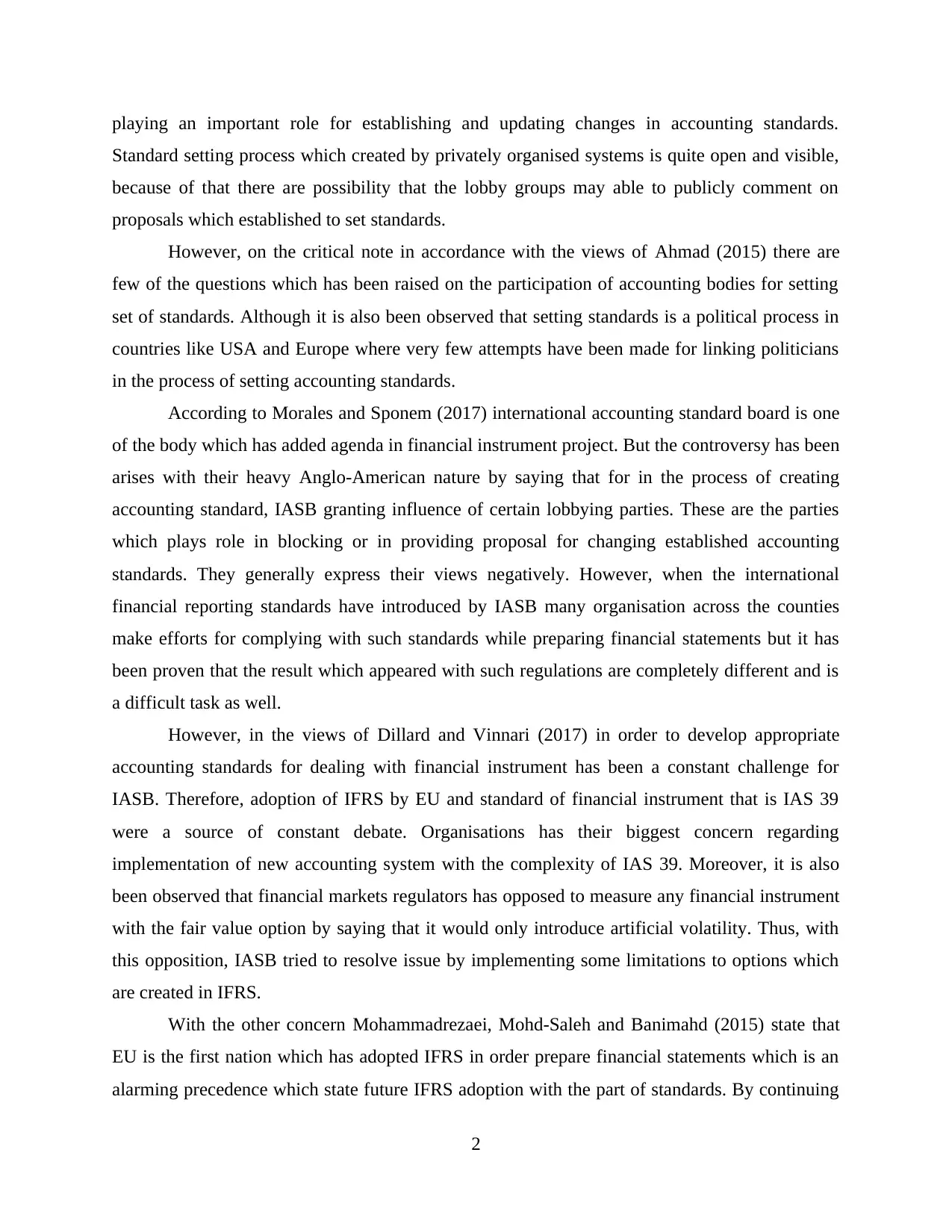
playing an important role for establishing and updating changes in accounting standards.
Standard setting process which created by privately organised systems is quite open and visible,
because of that there are possibility that the lobby groups may able to publicly comment on
proposals which established to set standards.
However, on the critical note in accordance with the views of Ahmad (2015) there are
few of the questions which has been raised on the participation of accounting bodies for setting
set of standards. Although it is also been observed that setting standards is a political process in
countries like USA and Europe where very few attempts have been made for linking politicians
in the process of setting accounting standards.
According to Morales and Sponem (2017) international accounting standard board is one
of the body which has added agenda in financial instrument project. But the controversy has been
arises with their heavy Anglo-American nature by saying that for in the process of creating
accounting standard, IASB granting influence of certain lobbying parties. These are the parties
which plays role in blocking or in providing proposal for changing established accounting
standards. They generally express their views negatively. However, when the international
financial reporting standards have introduced by IASB many organisation across the counties
make efforts for complying with such standards while preparing financial statements but it has
been proven that the result which appeared with such regulations are completely different and is
a difficult task as well.
However, in the views of Dillard and Vinnari (2017) in order to develop appropriate
accounting standards for dealing with financial instrument has been a constant challenge for
IASB. Therefore, adoption of IFRS by EU and standard of financial instrument that is IAS 39
were a source of constant debate. Organisations has their biggest concern regarding
implementation of new accounting system with the complexity of IAS 39. Moreover, it is also
been observed that financial markets regulators has opposed to measure any financial instrument
with the fair value option by saying that it would only introduce artificial volatility. Thus, with
this opposition, IASB tried to resolve issue by implementing some limitations to options which
are created in IFRS.
With the other concern Mohammadrezaei, Mohd-Saleh and Banimahd (2015) state that
EU is the first nation which has adopted IFRS in order prepare financial statements which is an
alarming precedence which state future IFRS adoption with the part of standards. By continuing
2
Standard setting process which created by privately organised systems is quite open and visible,
because of that there are possibility that the lobby groups may able to publicly comment on
proposals which established to set standards.
However, on the critical note in accordance with the views of Ahmad (2015) there are
few of the questions which has been raised on the participation of accounting bodies for setting
set of standards. Although it is also been observed that setting standards is a political process in
countries like USA and Europe where very few attempts have been made for linking politicians
in the process of setting accounting standards.
According to Morales and Sponem (2017) international accounting standard board is one
of the body which has added agenda in financial instrument project. But the controversy has been
arises with their heavy Anglo-American nature by saying that for in the process of creating
accounting standard, IASB granting influence of certain lobbying parties. These are the parties
which plays role in blocking or in providing proposal for changing established accounting
standards. They generally express their views negatively. However, when the international
financial reporting standards have introduced by IASB many organisation across the counties
make efforts for complying with such standards while preparing financial statements but it has
been proven that the result which appeared with such regulations are completely different and is
a difficult task as well.
However, in the views of Dillard and Vinnari (2017) in order to develop appropriate
accounting standards for dealing with financial instrument has been a constant challenge for
IASB. Therefore, adoption of IFRS by EU and standard of financial instrument that is IAS 39
were a source of constant debate. Organisations has their biggest concern regarding
implementation of new accounting system with the complexity of IAS 39. Moreover, it is also
been observed that financial markets regulators has opposed to measure any financial instrument
with the fair value option by saying that it would only introduce artificial volatility. Thus, with
this opposition, IASB tried to resolve issue by implementing some limitations to options which
are created in IFRS.
With the other concern Mohammadrezaei, Mohd-Saleh and Banimahd (2015) state that
EU is the first nation which has adopted IFRS in order prepare financial statements which is an
alarming precedence which state future IFRS adoption with the part of standards. By continuing
2
Paraphrase This Document
Need a fresh take? Get an instant paraphrase of this document with our AI Paraphraser
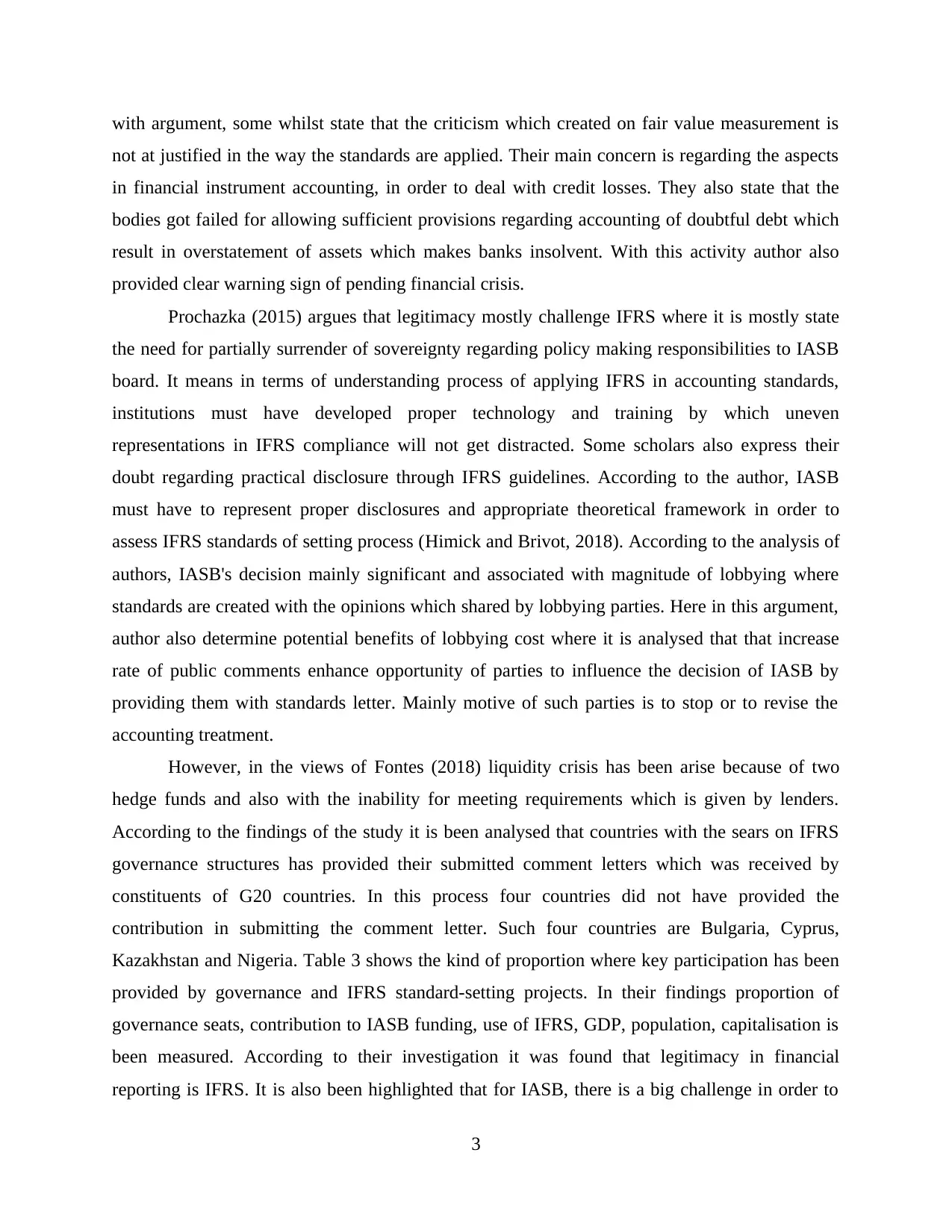
with argument, some whilst state that the criticism which created on fair value measurement is
not at justified in the way the standards are applied. Their main concern is regarding the aspects
in financial instrument accounting, in order to deal with credit losses. They also state that the
bodies got failed for allowing sufficient provisions regarding accounting of doubtful debt which
result in overstatement of assets which makes banks insolvent. With this activity author also
provided clear warning sign of pending financial crisis.
Prochazka (2015) argues that legitimacy mostly challenge IFRS where it is mostly state
the need for partially surrender of sovereignty regarding policy making responsibilities to IASB
board. It means in terms of understanding process of applying IFRS in accounting standards,
institutions must have developed proper technology and training by which uneven
representations in IFRS compliance will not get distracted. Some scholars also express their
doubt regarding practical disclosure through IFRS guidelines. According to the author, IASB
must have to represent proper disclosures and appropriate theoretical framework in order to
assess IFRS standards of setting process (Himick and Brivot, 2018). According to the analysis of
authors, IASB's decision mainly significant and associated with magnitude of lobbying where
standards are created with the opinions which shared by lobbying parties. Here in this argument,
author also determine potential benefits of lobbying cost where it is analysed that that increase
rate of public comments enhance opportunity of parties to influence the decision of IASB by
providing them with standards letter. Mainly motive of such parties is to stop or to revise the
accounting treatment.
However, in the views of Fontes (2018) liquidity crisis has been arise because of two
hedge funds and also with the inability for meeting requirements which is given by lenders.
According to the findings of the study it is been analysed that countries with the sears on IFRS
governance structures has provided their submitted comment letters which was received by
constituents of G20 countries. In this process four countries did not have provided the
contribution in submitting the comment letter. Such four countries are Bulgaria, Cyprus,
Kazakhstan and Nigeria. Table 3 shows the kind of proportion where key participation has been
provided by governance and IFRS standard-setting projects. In their findings proportion of
governance seats, contribution to IASB funding, use of IFRS, GDP, population, capitalisation is
been measured. According to their investigation it was found that legitimacy in financial
reporting is IFRS. It is also been highlighted that for IASB, there is a big challenge in order to
3
not at justified in the way the standards are applied. Their main concern is regarding the aspects
in financial instrument accounting, in order to deal with credit losses. They also state that the
bodies got failed for allowing sufficient provisions regarding accounting of doubtful debt which
result in overstatement of assets which makes banks insolvent. With this activity author also
provided clear warning sign of pending financial crisis.
Prochazka (2015) argues that legitimacy mostly challenge IFRS where it is mostly state
the need for partially surrender of sovereignty regarding policy making responsibilities to IASB
board. It means in terms of understanding process of applying IFRS in accounting standards,
institutions must have developed proper technology and training by which uneven
representations in IFRS compliance will not get distracted. Some scholars also express their
doubt regarding practical disclosure through IFRS guidelines. According to the author, IASB
must have to represent proper disclosures and appropriate theoretical framework in order to
assess IFRS standards of setting process (Himick and Brivot, 2018). According to the analysis of
authors, IASB's decision mainly significant and associated with magnitude of lobbying where
standards are created with the opinions which shared by lobbying parties. Here in this argument,
author also determine potential benefits of lobbying cost where it is analysed that that increase
rate of public comments enhance opportunity of parties to influence the decision of IASB by
providing them with standards letter. Mainly motive of such parties is to stop or to revise the
accounting treatment.
However, in the views of Fontes (2018) liquidity crisis has been arise because of two
hedge funds and also with the inability for meeting requirements which is given by lenders.
According to the findings of the study it is been analysed that countries with the sears on IFRS
governance structures has provided their submitted comment letters which was received by
constituents of G20 countries. In this process four countries did not have provided the
contribution in submitting the comment letter. Such four countries are Bulgaria, Cyprus,
Kazakhstan and Nigeria. Table 3 shows the kind of proportion where key participation has been
provided by governance and IFRS standard-setting projects. In their findings proportion of
governance seats, contribution to IASB funding, use of IFRS, GDP, population, capitalisation is
been measured. According to their investigation it was found that legitimacy in financial
reporting is IFRS. It is also been highlighted that for IASB, there is a big challenge in order to
3
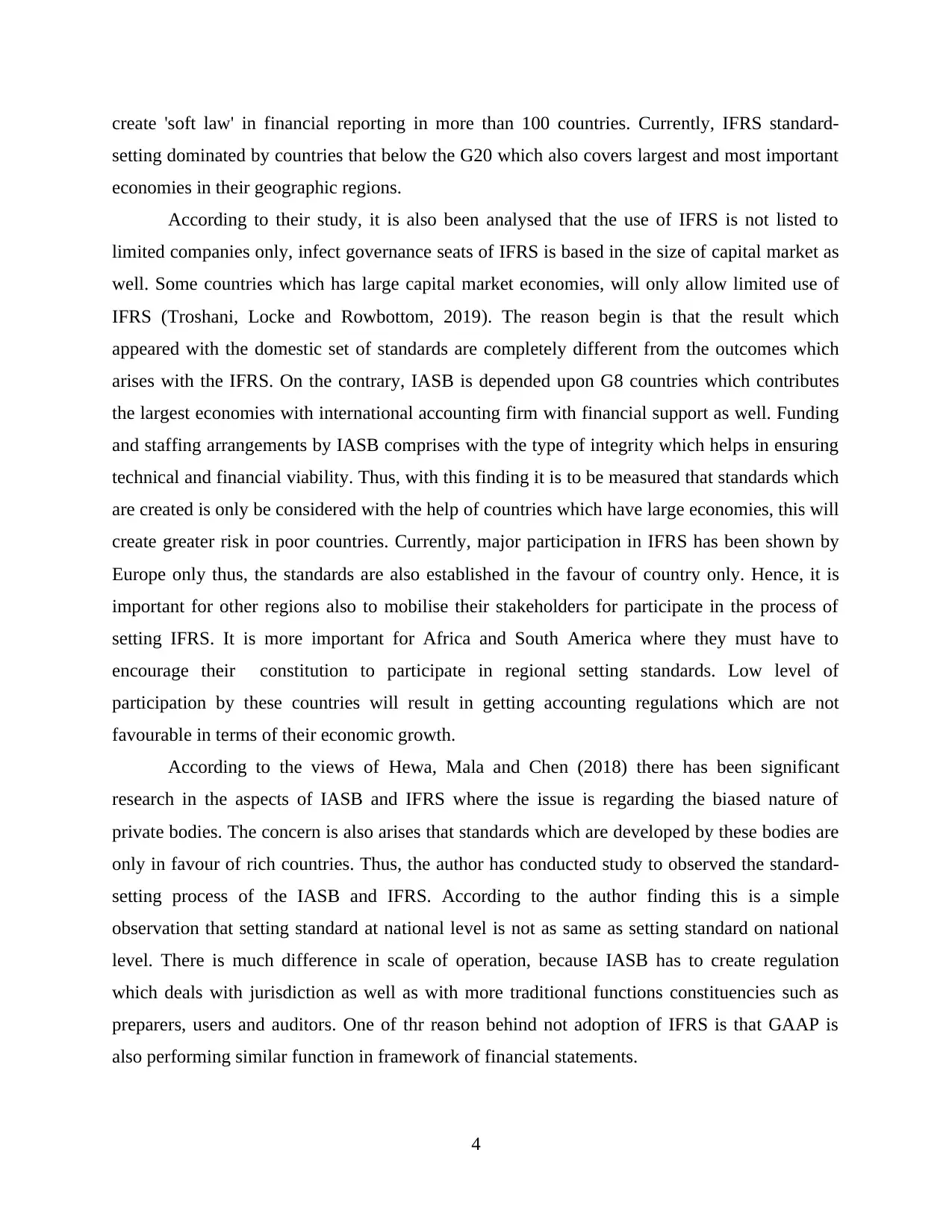
create 'soft law' in financial reporting in more than 100 countries. Currently, IFRS standard-
setting dominated by countries that below the G20 which also covers largest and most important
economies in their geographic regions.
According to their study, it is also been analysed that the use of IFRS is not listed to
limited companies only, infect governance seats of IFRS is based in the size of capital market as
well. Some countries which has large capital market economies, will only allow limited use of
IFRS (Troshani, Locke and Rowbottom, 2019). The reason begin is that the result which
appeared with the domestic set of standards are completely different from the outcomes which
arises with the IFRS. On the contrary, IASB is depended upon G8 countries which contributes
the largest economies with international accounting firm with financial support as well. Funding
and staffing arrangements by IASB comprises with the type of integrity which helps in ensuring
technical and financial viability. Thus, with this finding it is to be measured that standards which
are created is only be considered with the help of countries which have large economies, this will
create greater risk in poor countries. Currently, major participation in IFRS has been shown by
Europe only thus, the standards are also established in the favour of country only. Hence, it is
important for other regions also to mobilise their stakeholders for participate in the process of
setting IFRS. It is more important for Africa and South America where they must have to
encourage their constitution to participate in regional setting standards. Low level of
participation by these countries will result in getting accounting regulations which are not
favourable in terms of their economic growth.
According to the views of Hewa, Mala and Chen (2018) there has been significant
research in the aspects of IASB and IFRS where the issue is regarding the biased nature of
private bodies. The concern is also arises that standards which are developed by these bodies are
only in favour of rich countries. Thus, the author has conducted study to observed the standard-
setting process of the IASB and IFRS. According to the author finding this is a simple
observation that setting standard at national level is not as same as setting standard on national
level. There is much difference in scale of operation, because IASB has to create regulation
which deals with jurisdiction as well as with more traditional functions constituencies such as
preparers, users and auditors. One of thr reason behind not adoption of IFRS is that GAAP is
also performing similar function in framework of financial statements.
4
setting dominated by countries that below the G20 which also covers largest and most important
economies in their geographic regions.
According to their study, it is also been analysed that the use of IFRS is not listed to
limited companies only, infect governance seats of IFRS is based in the size of capital market as
well. Some countries which has large capital market economies, will only allow limited use of
IFRS (Troshani, Locke and Rowbottom, 2019). The reason begin is that the result which
appeared with the domestic set of standards are completely different from the outcomes which
arises with the IFRS. On the contrary, IASB is depended upon G8 countries which contributes
the largest economies with international accounting firm with financial support as well. Funding
and staffing arrangements by IASB comprises with the type of integrity which helps in ensuring
technical and financial viability. Thus, with this finding it is to be measured that standards which
are created is only be considered with the help of countries which have large economies, this will
create greater risk in poor countries. Currently, major participation in IFRS has been shown by
Europe only thus, the standards are also established in the favour of country only. Hence, it is
important for other regions also to mobilise their stakeholders for participate in the process of
setting IFRS. It is more important for Africa and South America where they must have to
encourage their constitution to participate in regional setting standards. Low level of
participation by these countries will result in getting accounting regulations which are not
favourable in terms of their economic growth.
According to the views of Hewa, Mala and Chen (2018) there has been significant
research in the aspects of IASB and IFRS where the issue is regarding the biased nature of
private bodies. The concern is also arises that standards which are developed by these bodies are
only in favour of rich countries. Thus, the author has conducted study to observed the standard-
setting process of the IASB and IFRS. According to the author finding this is a simple
observation that setting standard at national level is not as same as setting standard on national
level. There is much difference in scale of operation, because IASB has to create regulation
which deals with jurisdiction as well as with more traditional functions constituencies such as
preparers, users and auditors. One of thr reason behind not adoption of IFRS is that GAAP is
also performing similar function in framework of financial statements.
4
⊘ This is a preview!⊘
Do you want full access?
Subscribe today to unlock all pages.

Trusted by 1+ million students worldwide
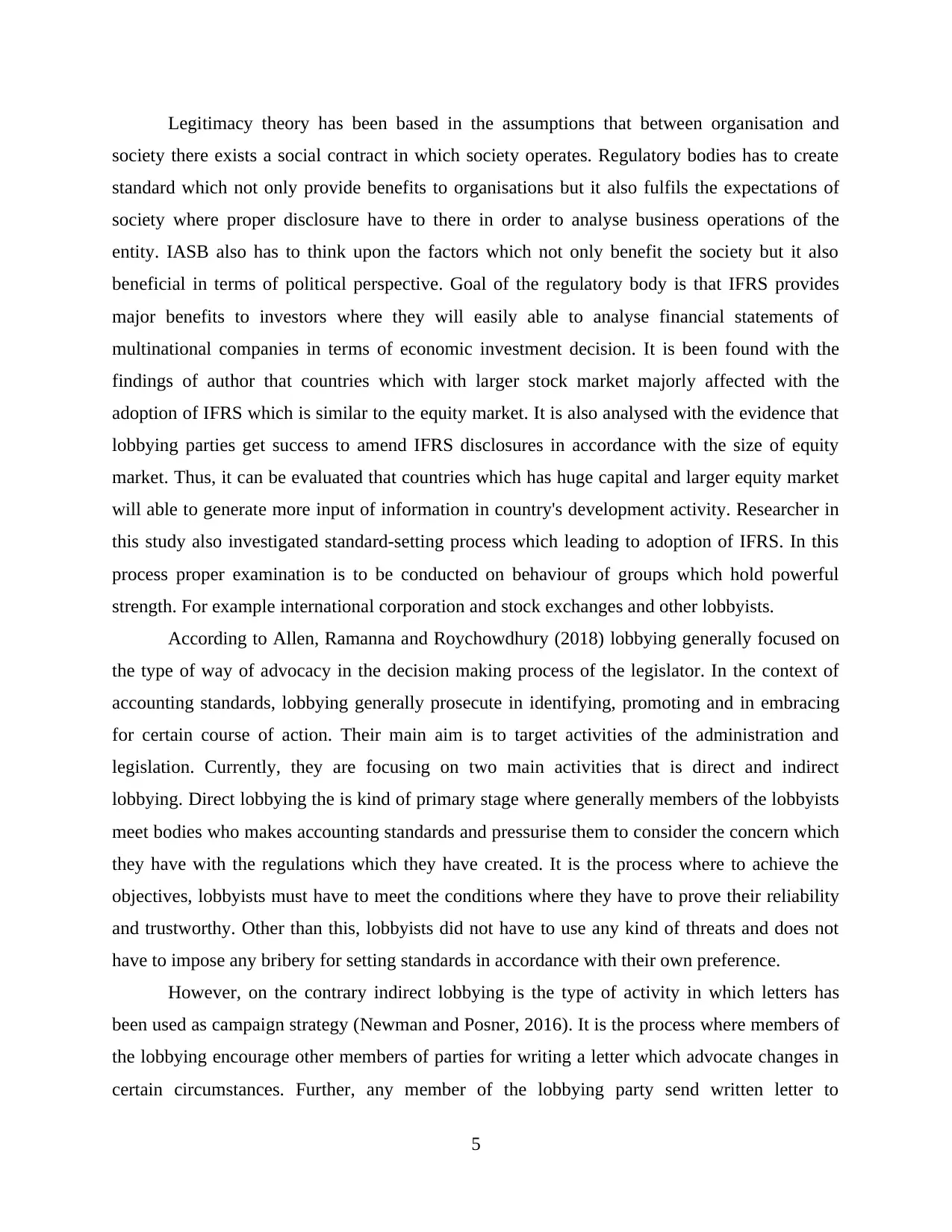
Legitimacy theory has been based in the assumptions that between organisation and
society there exists a social contract in which society operates. Regulatory bodies has to create
standard which not only provide benefits to organisations but it also fulfils the expectations of
society where proper disclosure have to there in order to analyse business operations of the
entity. IASB also has to think upon the factors which not only benefit the society but it also
beneficial in terms of political perspective. Goal of the regulatory body is that IFRS provides
major benefits to investors where they will easily able to analyse financial statements of
multinational companies in terms of economic investment decision. It is been found with the
findings of author that countries which with larger stock market majorly affected with the
adoption of IFRS which is similar to the equity market. It is also analysed with the evidence that
lobbying parties get success to amend IFRS disclosures in accordance with the size of equity
market. Thus, it can be evaluated that countries which has huge capital and larger equity market
will able to generate more input of information in country's development activity. Researcher in
this study also investigated standard-setting process which leading to adoption of IFRS. In this
process proper examination is to be conducted on behaviour of groups which hold powerful
strength. For example international corporation and stock exchanges and other lobbyists.
According to Allen, Ramanna and Roychowdhury (2018) lobbying generally focused on
the type of way of advocacy in the decision making process of the legislator. In the context of
accounting standards, lobbying generally prosecute in identifying, promoting and in embracing
for certain course of action. Their main aim is to target activities of the administration and
legislation. Currently, they are focusing on two main activities that is direct and indirect
lobbying. Direct lobbying the is kind of primary stage where generally members of the lobbyists
meet bodies who makes accounting standards and pressurise them to consider the concern which
they have with the regulations which they have created. It is the process where to achieve the
objectives, lobbyists must have to meet the conditions where they have to prove their reliability
and trustworthy. Other than this, lobbyists did not have to use any kind of threats and does not
have to impose any bribery for setting standards in accordance with their own preference.
However, on the contrary indirect lobbying is the type of activity in which letters has
been used as campaign strategy (Newman and Posner, 2016). It is the process where members of
the lobbying encourage other members of parties for writing a letter which advocate changes in
certain circumstances. Further, any member of the lobbying party send written letter to
5
society there exists a social contract in which society operates. Regulatory bodies has to create
standard which not only provide benefits to organisations but it also fulfils the expectations of
society where proper disclosure have to there in order to analyse business operations of the
entity. IASB also has to think upon the factors which not only benefit the society but it also
beneficial in terms of political perspective. Goal of the regulatory body is that IFRS provides
major benefits to investors where they will easily able to analyse financial statements of
multinational companies in terms of economic investment decision. It is been found with the
findings of author that countries which with larger stock market majorly affected with the
adoption of IFRS which is similar to the equity market. It is also analysed with the evidence that
lobbying parties get success to amend IFRS disclosures in accordance with the size of equity
market. Thus, it can be evaluated that countries which has huge capital and larger equity market
will able to generate more input of information in country's development activity. Researcher in
this study also investigated standard-setting process which leading to adoption of IFRS. In this
process proper examination is to be conducted on behaviour of groups which hold powerful
strength. For example international corporation and stock exchanges and other lobbyists.
According to Allen, Ramanna and Roychowdhury (2018) lobbying generally focused on
the type of way of advocacy in the decision making process of the legislator. In the context of
accounting standards, lobbying generally prosecute in identifying, promoting and in embracing
for certain course of action. Their main aim is to target activities of the administration and
legislation. Currently, they are focusing on two main activities that is direct and indirect
lobbying. Direct lobbying the is kind of primary stage where generally members of the lobbyists
meet bodies who makes accounting standards and pressurise them to consider the concern which
they have with the regulations which they have created. It is the process where to achieve the
objectives, lobbyists must have to meet the conditions where they have to prove their reliability
and trustworthy. Other than this, lobbyists did not have to use any kind of threats and does not
have to impose any bribery for setting standards in accordance with their own preference.
However, on the contrary indirect lobbying is the type of activity in which letters has
been used as campaign strategy (Newman and Posner, 2016). It is the process where members of
the lobbying encourage other members of parties for writing a letter which advocate changes in
certain circumstances. Further, any member of the lobbying party send written letter to
5
Paraphrase This Document
Need a fresh take? Get an instant paraphrase of this document with our AI Paraphraser
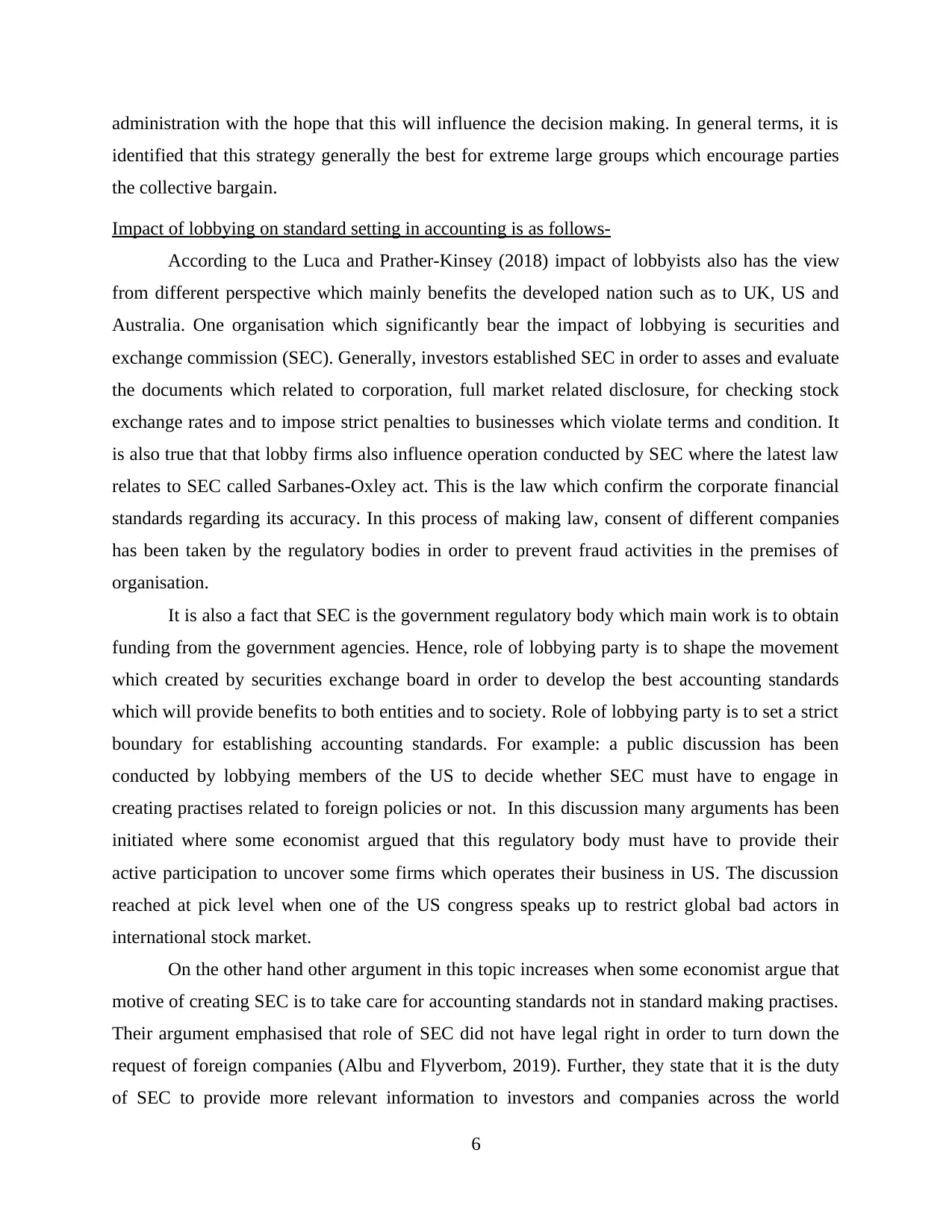
administration with the hope that this will influence the decision making. In general terms, it is
identified that this strategy generally the best for extreme large groups which encourage parties
the collective bargain.
Impact of lobbying on standard setting in accounting is as follows-
According to the Luca and Prather-Kinsey (2018) impact of lobbyists also has the view
from different perspective which mainly benefits the developed nation such as to UK, US and
Australia. One organisation which significantly bear the impact of lobbying is securities and
exchange commission (SEC). Generally, investors established SEC in order to asses and evaluate
the documents which related to corporation, full market related disclosure, for checking stock
exchange rates and to impose strict penalties to businesses which violate terms and condition. It
is also true that that lobby firms also influence operation conducted by SEC where the latest law
relates to SEC called Sarbanes-Oxley act. This is the law which confirm the corporate financial
standards regarding its accuracy. In this process of making law, consent of different companies
has been taken by the regulatory bodies in order to prevent fraud activities in the premises of
organisation.
It is also a fact that SEC is the government regulatory body which main work is to obtain
funding from the government agencies. Hence, role of lobbying party is to shape the movement
which created by securities exchange board in order to develop the best accounting standards
which will provide benefits to both entities and to society. Role of lobbying party is to set a strict
boundary for establishing accounting standards. For example: a public discussion has been
conducted by lobbying members of the US to decide whether SEC must have to engage in
creating practises related to foreign policies or not. In this discussion many arguments has been
initiated where some economist argued that this regulatory body must have to provide their
active participation to uncover some firms which operates their business in US. The discussion
reached at pick level when one of the US congress speaks up to restrict global bad actors in
international stock market.
On the other hand other argument in this topic increases when some economist argue that
motive of creating SEC is to take care for accounting standards not in standard making practises.
Their argument emphasised that role of SEC did not have legal right in order to turn down the
request of foreign companies (Albu and Flyverbom, 2019). Further, they state that it is the duty
of SEC to provide more relevant information to investors and companies across the world
6
identified that this strategy generally the best for extreme large groups which encourage parties
the collective bargain.
Impact of lobbying on standard setting in accounting is as follows-
According to the Luca and Prather-Kinsey (2018) impact of lobbyists also has the view
from different perspective which mainly benefits the developed nation such as to UK, US and
Australia. One organisation which significantly bear the impact of lobbying is securities and
exchange commission (SEC). Generally, investors established SEC in order to asses and evaluate
the documents which related to corporation, full market related disclosure, for checking stock
exchange rates and to impose strict penalties to businesses which violate terms and condition. It
is also true that that lobby firms also influence operation conducted by SEC where the latest law
relates to SEC called Sarbanes-Oxley act. This is the law which confirm the corporate financial
standards regarding its accuracy. In this process of making law, consent of different companies
has been taken by the regulatory bodies in order to prevent fraud activities in the premises of
organisation.
It is also a fact that SEC is the government regulatory body which main work is to obtain
funding from the government agencies. Hence, role of lobbying party is to shape the movement
which created by securities exchange board in order to develop the best accounting standards
which will provide benefits to both entities and to society. Role of lobbying party is to set a strict
boundary for establishing accounting standards. For example: a public discussion has been
conducted by lobbying members of the US to decide whether SEC must have to engage in
creating practises related to foreign policies or not. In this discussion many arguments has been
initiated where some economist argued that this regulatory body must have to provide their
active participation to uncover some firms which operates their business in US. The discussion
reached at pick level when one of the US congress speaks up to restrict global bad actors in
international stock market.
On the other hand other argument in this topic increases when some economist argue that
motive of creating SEC is to take care for accounting standards not in standard making practises.
Their argument emphasised that role of SEC did not have legal right in order to turn down the
request of foreign companies (Albu and Flyverbom, 2019). Further, they state that it is the duty
of SEC to provide more relevant information to investors and companies across the world
6
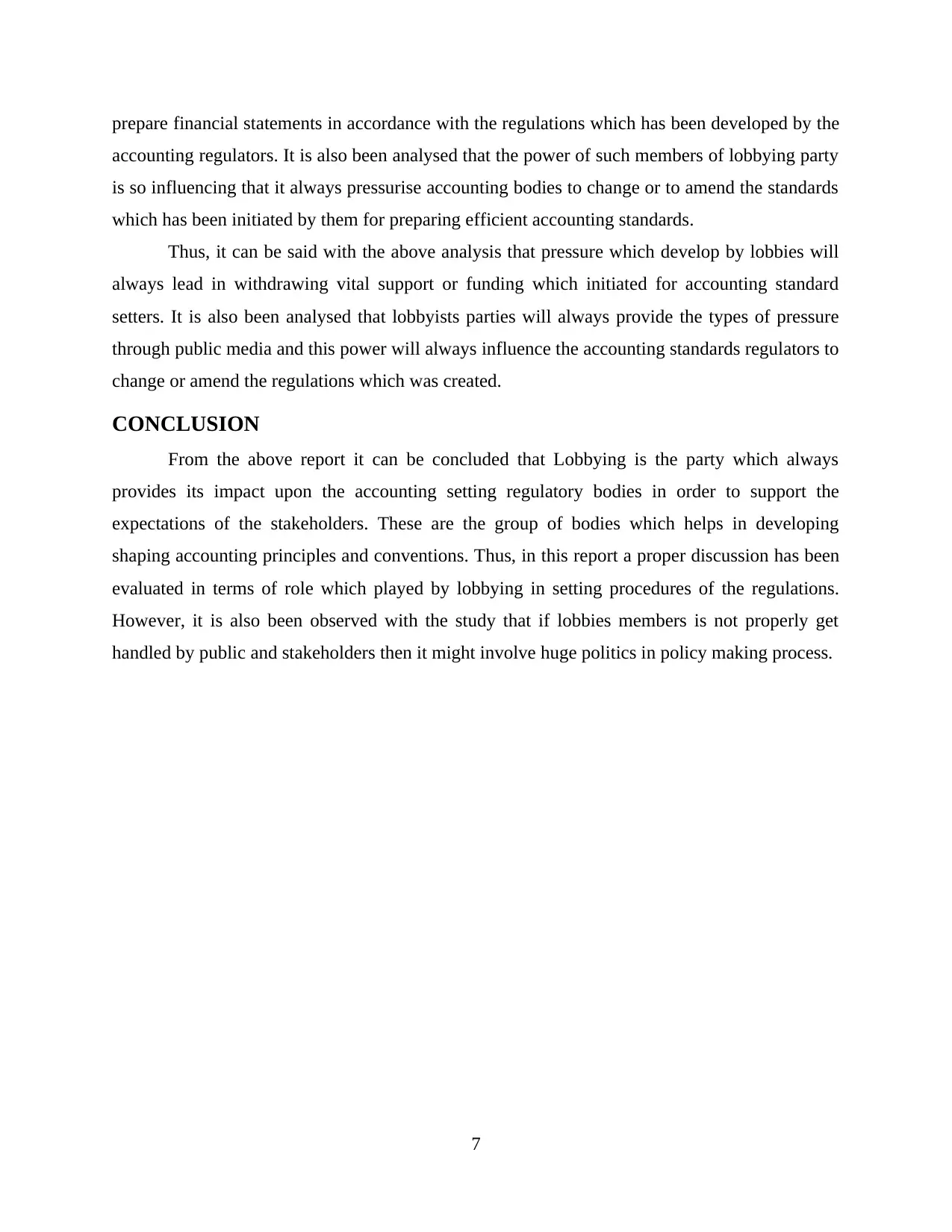
prepare financial statements in accordance with the regulations which has been developed by the
accounting regulators. It is also been analysed that the power of such members of lobbying party
is so influencing that it always pressurise accounting bodies to change or to amend the standards
which has been initiated by them for preparing efficient accounting standards.
Thus, it can be said with the above analysis that pressure which develop by lobbies will
always lead in withdrawing vital support or funding which initiated for accounting standard
setters. It is also been analysed that lobbyists parties will always provide the types of pressure
through public media and this power will always influence the accounting standards regulators to
change or amend the regulations which was created.
CONCLUSION
From the above report it can be concluded that Lobbying is the party which always
provides its impact upon the accounting setting regulatory bodies in order to support the
expectations of the stakeholders. These are the group of bodies which helps in developing
shaping accounting principles and conventions. Thus, in this report a proper discussion has been
evaluated in terms of role which played by lobbying in setting procedures of the regulations.
However, it is also been observed with the study that if lobbies members is not properly get
handled by public and stakeholders then it might involve huge politics in policy making process.
7
accounting regulators. It is also been analysed that the power of such members of lobbying party
is so influencing that it always pressurise accounting bodies to change or to amend the standards
which has been initiated by them for preparing efficient accounting standards.
Thus, it can be said with the above analysis that pressure which develop by lobbies will
always lead in withdrawing vital support or funding which initiated for accounting standard
setters. It is also been analysed that lobbyists parties will always provide the types of pressure
through public media and this power will always influence the accounting standards regulators to
change or amend the regulations which was created.
CONCLUSION
From the above report it can be concluded that Lobbying is the party which always
provides its impact upon the accounting setting regulatory bodies in order to support the
expectations of the stakeholders. These are the group of bodies which helps in developing
shaping accounting principles and conventions. Thus, in this report a proper discussion has been
evaluated in terms of role which played by lobbying in setting procedures of the regulations.
However, it is also been observed with the study that if lobbies members is not properly get
handled by public and stakeholders then it might involve huge politics in policy making process.
7
⊘ This is a preview!⊘
Do you want full access?
Subscribe today to unlock all pages.

Trusted by 1+ million students worldwide
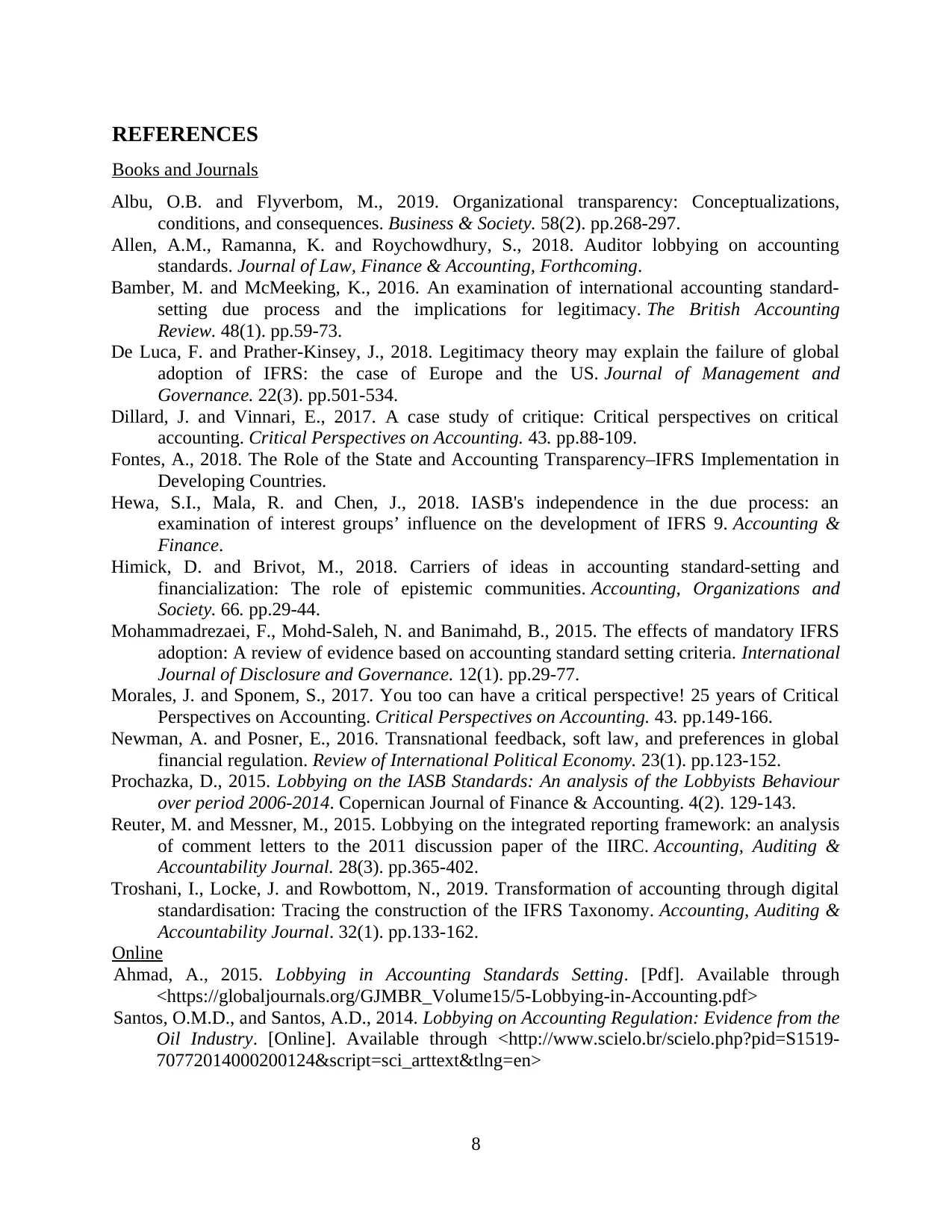
REFERENCES
Books and Journals
Albu, O.B. and Flyverbom, M., 2019. Organizational transparency: Conceptualizations,
conditions, and consequences. Business & Society. 58(2). pp.268-297.
Allen, A.M., Ramanna, K. and Roychowdhury, S., 2018. Auditor lobbying on accounting
standards. Journal of Law, Finance & Accounting, Forthcoming.
Bamber, M. and McMeeking, K., 2016. An examination of international accounting standard-
setting due process and the implications for legitimacy. The British Accounting
Review. 48(1). pp.59-73.
De Luca, F. and Prather-Kinsey, J., 2018. Legitimacy theory may explain the failure of global
adoption of IFRS: the case of Europe and the US. Journal of Management and
Governance. 22(3). pp.501-534.
Dillard, J. and Vinnari, E., 2017. A case study of critique: Critical perspectives on critical
accounting. Critical Perspectives on Accounting. 43. pp.88-109.
Fontes, A., 2018. The Role of the State and Accounting Transparency–IFRS Implementation in
Developing Countries.
Hewa, S.I., Mala, R. and Chen, J., 2018. IASB's independence in the due process: an
examination of interest groups’ influence on the development of IFRS 9. Accounting &
Finance.
Himick, D. and Brivot, M., 2018. Carriers of ideas in accounting standard-setting and
financialization: The role of epistemic communities. Accounting, Organizations and
Society. 66. pp.29-44.
Mohammadrezaei, F., Mohd-Saleh, N. and Banimahd, B., 2015. The effects of mandatory IFRS
adoption: A review of evidence based on accounting standard setting criteria. International
Journal of Disclosure and Governance. 12(1). pp.29-77.
Morales, J. and Sponem, S., 2017. You too can have a critical perspective! 25 years of Critical
Perspectives on Accounting. Critical Perspectives on Accounting. 43. pp.149-166.
Newman, A. and Posner, E., 2016. Transnational feedback, soft law, and preferences in global
financial regulation. Review of International Political Economy. 23(1). pp.123-152.
Prochazka, D., 2015. Lobbying on the IASB Standards: An analysis of the Lobbyists Behaviour
over period 2006-2014. Copernican Journal of Finance & Accounting. 4(2). 129-143.
Reuter, M. and Messner, M., 2015. Lobbying on the integrated reporting framework: an analysis
of comment letters to the 2011 discussion paper of the IIRC. Accounting, Auditing &
Accountability Journal. 28(3). pp.365-402.
Troshani, I., Locke, J. and Rowbottom, N., 2019. Transformation of accounting through digital
standardisation: Tracing the construction of the IFRS Taxonomy. Accounting, Auditing &
Accountability Journal. 32(1). pp.133-162.
Online
Ahmad, A., 2015. Lobbying in Accounting Standards Setting. [Pdf]. Available through
<https://globaljournals.org/GJMBR_Volume15/5-Lobbying-in-Accounting.pdf>
Santos, O.M.D., and Santos, A.D., 2014. Lobbying on Accounting Regulation: Evidence from the
Oil Industry. [Online]. Available through <http://www.scielo.br/scielo.php?pid=S1519-
70772014000200124&script=sci_arttext&tlng=en>
8
Books and Journals
Albu, O.B. and Flyverbom, M., 2019. Organizational transparency: Conceptualizations,
conditions, and consequences. Business & Society. 58(2). pp.268-297.
Allen, A.M., Ramanna, K. and Roychowdhury, S., 2018. Auditor lobbying on accounting
standards. Journal of Law, Finance & Accounting, Forthcoming.
Bamber, M. and McMeeking, K., 2016. An examination of international accounting standard-
setting due process and the implications for legitimacy. The British Accounting
Review. 48(1). pp.59-73.
De Luca, F. and Prather-Kinsey, J., 2018. Legitimacy theory may explain the failure of global
adoption of IFRS: the case of Europe and the US. Journal of Management and
Governance. 22(3). pp.501-534.
Dillard, J. and Vinnari, E., 2017. A case study of critique: Critical perspectives on critical
accounting. Critical Perspectives on Accounting. 43. pp.88-109.
Fontes, A., 2018. The Role of the State and Accounting Transparency–IFRS Implementation in
Developing Countries.
Hewa, S.I., Mala, R. and Chen, J., 2018. IASB's independence in the due process: an
examination of interest groups’ influence on the development of IFRS 9. Accounting &
Finance.
Himick, D. and Brivot, M., 2018. Carriers of ideas in accounting standard-setting and
financialization: The role of epistemic communities. Accounting, Organizations and
Society. 66. pp.29-44.
Mohammadrezaei, F., Mohd-Saleh, N. and Banimahd, B., 2015. The effects of mandatory IFRS
adoption: A review of evidence based on accounting standard setting criteria. International
Journal of Disclosure and Governance. 12(1). pp.29-77.
Morales, J. and Sponem, S., 2017. You too can have a critical perspective! 25 years of Critical
Perspectives on Accounting. Critical Perspectives on Accounting. 43. pp.149-166.
Newman, A. and Posner, E., 2016. Transnational feedback, soft law, and preferences in global
financial regulation. Review of International Political Economy. 23(1). pp.123-152.
Prochazka, D., 2015. Lobbying on the IASB Standards: An analysis of the Lobbyists Behaviour
over period 2006-2014. Copernican Journal of Finance & Accounting. 4(2). 129-143.
Reuter, M. and Messner, M., 2015. Lobbying on the integrated reporting framework: an analysis
of comment letters to the 2011 discussion paper of the IIRC. Accounting, Auditing &
Accountability Journal. 28(3). pp.365-402.
Troshani, I., Locke, J. and Rowbottom, N., 2019. Transformation of accounting through digital
standardisation: Tracing the construction of the IFRS Taxonomy. Accounting, Auditing &
Accountability Journal. 32(1). pp.133-162.
Online
Ahmad, A., 2015. Lobbying in Accounting Standards Setting. [Pdf]. Available through
<https://globaljournals.org/GJMBR_Volume15/5-Lobbying-in-Accounting.pdf>
Santos, O.M.D., and Santos, A.D., 2014. Lobbying on Accounting Regulation: Evidence from the
Oil Industry. [Online]. Available through <http://www.scielo.br/scielo.php?pid=S1519-
70772014000200124&script=sci_arttext&tlng=en>
8
Paraphrase This Document
Need a fresh take? Get an instant paraphrase of this document with our AI Paraphraser
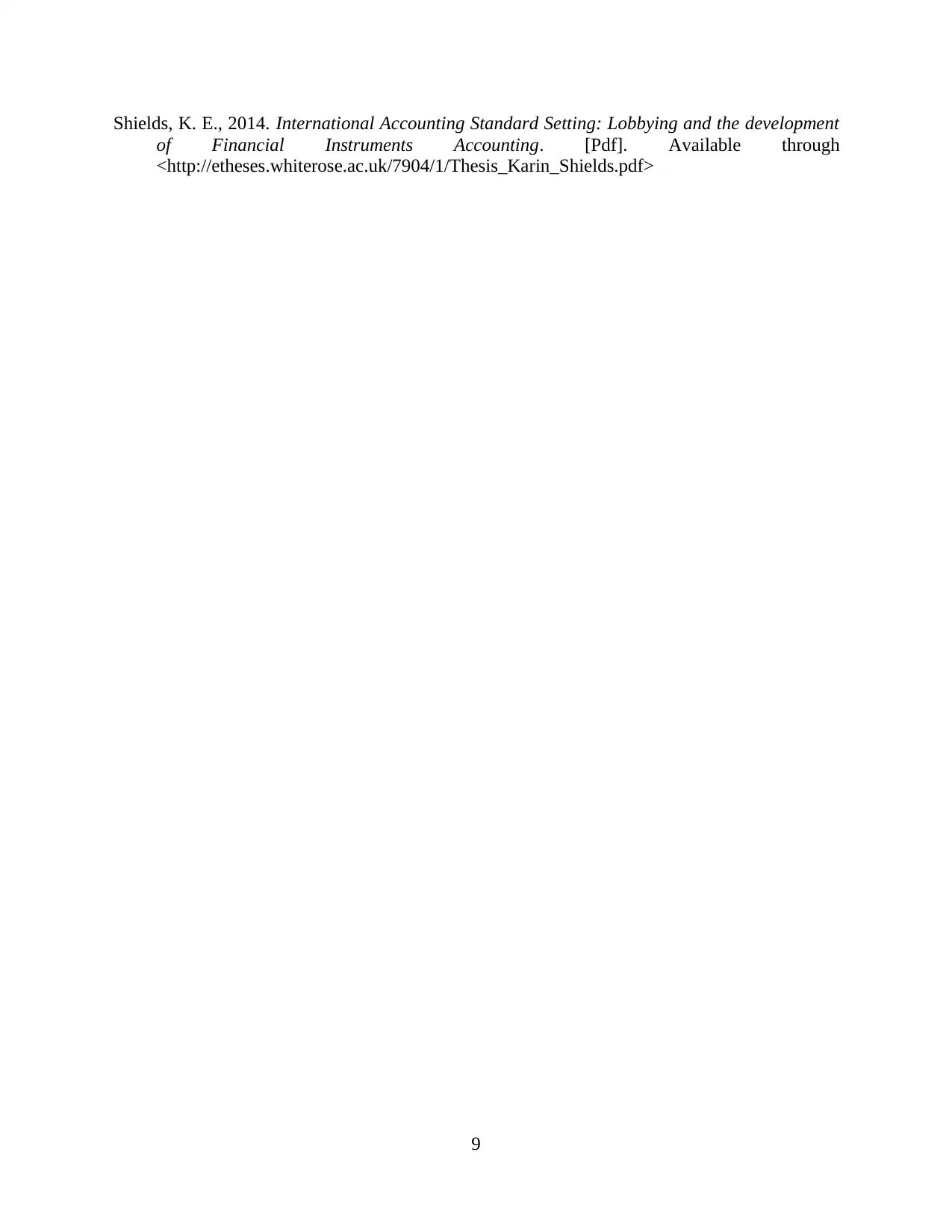
Shields, K. E., 2014. International Accounting Standard Setting: Lobbying and the development
of Financial Instruments Accounting. [Pdf]. Available through
<http://etheses.whiterose.ac.uk/7904/1/Thesis_Karin_Shields.pdf>
9
of Financial Instruments Accounting. [Pdf]. Available through
<http://etheses.whiterose.ac.uk/7904/1/Thesis_Karin_Shields.pdf>
9
1 out of 11
Related Documents
Your All-in-One AI-Powered Toolkit for Academic Success.
+13062052269
info@desklib.com
Available 24*7 on WhatsApp / Email
![[object Object]](/_next/static/media/star-bottom.7253800d.svg)
Unlock your academic potential
Copyright © 2020–2025 A2Z Services. All Rights Reserved. Developed and managed by ZUCOL.



